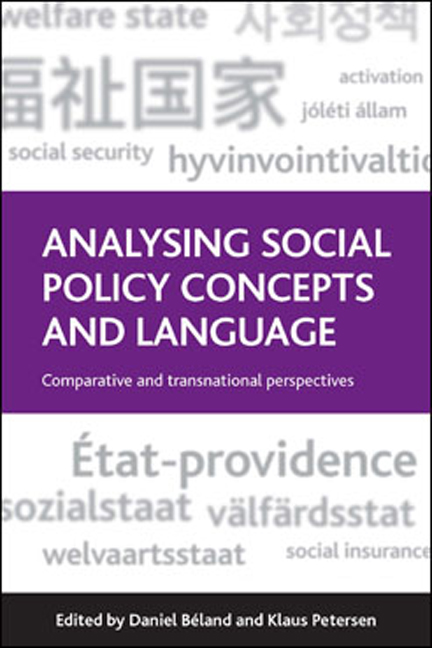Book contents
- Frontmatter
- Contents
- List of figures and tables
- Acknowledgement
- Notes on contributors
- Introduction: social policy concepts and language
- one Social policy language in Denmark and Sweden
- two The changing language of social policy in Hungary and Polan
- three Languages of ‘social policy’ at ‘the EU level’
- four The OECD's search for a new social policy language: from welfare state to active society
- five The discursive power of international organisations: social policy language and concepts in the World Bank and the International Monetary Fund
- six Original and imitated or elusive and limited? Towards a genealogy of the welfare state idea in Britain
- seven Social policy concepts and language in France
- eight The language of social politics in Finland
- nine Germany: constructing the ‘win-win’ society
- ten Conceptual development of welfare and social policy in Japan
- eleven Transition to the ‘universal’ welfare state: the changing meaning of ‘welfare state’ in Korea
- twelve The Dutch ‘caring state’
- thirteen Panacea, problem or perish: social policy language in New Zealand
- fourteen Evolving social policy languages in Spain: what did democracy and EU membership change?
- fifteen Social policy language in the United States
- Conclusion: comparative perspectives on social policy language
- Index
eleven - Transition to the ‘universal’ welfare state: the changing meaning of ‘welfare state’ in Korea
Published online by Cambridge University Press: 04 March 2022
- Frontmatter
- Contents
- List of figures and tables
- Acknowledgement
- Notes on contributors
- Introduction: social policy concepts and language
- one Social policy language in Denmark and Sweden
- two The changing language of social policy in Hungary and Polan
- three Languages of ‘social policy’ at ‘the EU level’
- four The OECD's search for a new social policy language: from welfare state to active society
- five The discursive power of international organisations: social policy language and concepts in the World Bank and the International Monetary Fund
- six Original and imitated or elusive and limited? Towards a genealogy of the welfare state idea in Britain
- seven Social policy concepts and language in France
- eight The language of social politics in Finland
- nine Germany: constructing the ‘win-win’ society
- ten Conceptual development of welfare and social policy in Japan
- eleven Transition to the ‘universal’ welfare state: the changing meaning of ‘welfare state’ in Korea
- twelve The Dutch ‘caring state’
- thirteen Panacea, problem or perish: social policy language in New Zealand
- fourteen Evolving social policy languages in Spain: what did democracy and EU membership change?
- fifteen Social policy language in the United States
- Conclusion: comparative perspectives on social policy language
- Index
Summary
When the current author's book, The Welfare State in Korea: the Politics of Legitimation, was published in the late 1990s (Kwon, 1999), many fellow Korean academics and students asked the same question: ‘Do you think Korea is a welfare state?’ The response was, ‘Korea is not a welfare state, but the book examines the welfare state in Korea’. People were a little confused at this answer. This was because the concept of the welfare state had at least two different meanings. First, in the Korean language, the welfare state (Pokjikukga) is a nation-state that provides a comprehensive range of social protection to its citizens, a kind of ideal state of affairs. At the time of the book's publication, the Asian economic crisis that began in 1997–8 had taken its toll. Not only were many Korean citizens hard hit by the economic downturn, but those who escaped it also felt vulnerable due to the lack of social protection. Most Korean people did not consider Korea to be a welfare state in the sense described here. Rather, they felt that Korea fell far short of the mark, and that it should strive further to become a welfare state, a sort of ‘good society’, which is still the language very much used every day by the Korean media and the general public.
Second, the welfare state is understood as a set of public institutions and policies that aim to provide social protection to citizens. The state (Kukga) in the Korean language is a collection of public institutions and policies, and thus the welfare state is a set of public institutions and policies that aim to provide social protection for citizens.106 This second understanding of the welfare state is more analytical than the first one. The author's book (Kwon, 1999) in fact adopts this second definition of the welfare state, as it enables an examination of those public institutions and policies for social protection, even though they may not be able to provide comprehensive social protection to citizens.
Fifteen years after the Asian economic crisis, Korean society was engaged in a debate on the ‘universal’ welfare state.
- Type
- Chapter
- Information
- Analysing Social Policy Concepts and LanguageComparative and Transnational Perspectives, pp. 211 - 228Publisher: Bristol University PressPrint publication year: 2014
- 2
- Cited by



